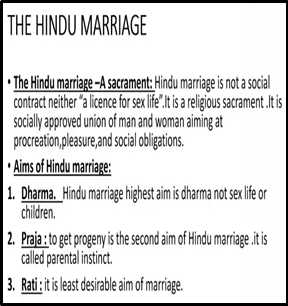HIGH COURT DENIES PROTECTION FOR INTERFAITH COUPLE’S SPECIAL MARRIAGE ACT WEDDING
Why in the news?
- Madhya Pradesh High Court denied protection to an interfaith couple wishing to marry under the Special Marriage Act.
- The court stated that according to Muslim law, a marriage between a Muslim man and a Hindu woman is not considered valid, even if registered under the Special Marriage Act. It would be considered an irregular marriage.
- The judge emphasized that while the Special Marriage Act allows marriages without specific rituals, it does not legalize marriages prohibited by personal laws.
source:slideshare
About The Special Marriage Act (SMA)1954 :
- The Special Marriage Act (SMA) was enacted in 1954 by Parliament.
- It facilitates civil marriages sanctioned by the state, not religion.
- Personal law governs issues like marriage, divorce, and adoption under religious codes.
- Laws like the Muslim Marriage Act (1954) and Hindu Marriage Act (1955) require conversion before marriage.
- SMA allows interfaith or inter-caste marriages without religious conversion.
- Both civil and religious marriages are recognized in India.
- SMA preserves individuals’ religious identity in interfaith marriages.
What is the Notice period under the Special Marriage Act (SMA)?
What is The Hindu Marriage Act, 1955?
Associated Article: |




